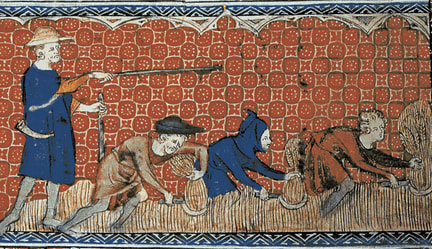FEUDALISM
Feudalism was a form of government common during medieval Europe that involved society being structured in a very rigid and hierarchical way. It was popular in European society from the 9th century until the 15th century and was the form of government in which the country was dominated by an absolute monarch, in which all power was held within a single king. The monarch would rule over the country while the rest of the people were bound by a hierarchical system in which people were placed into estates in which they were born.
In general, feudal societies would have three estates, including: clergy, nobility and peasants. The clergy were the first estate, the nobility the second, and the peasants would represent the third estate. The clergy and the nobility enjoyed the most power and prestige in society and generally held most of the important positions in the government and military, while the peasants, who made up the vast majority of people, lacked any sort of power but did the most work.
In general, feudal societies would have three estates, including: clergy, nobility and peasants. The clergy were the first estate, the nobility the second, and the peasants would represent the third estate. The clergy and the nobility enjoyed the most power and prestige in society and generally held most of the important positions in the government and military, while the peasants, who made up the vast majority of people, lacked any sort of power but did the most work.
|
Another way of understanding feudalism is through the ownership and working of the land. In a feudal society, the land was owned by noble lords and worked by the local peasants, who were also referred to as serfs. The lords would receive the land from the monarch who would in return expect the noble lords to provide the king with soldiers for his armies, which would often come from the peasant class. Peasants would work for the noble lord in exchange for the ability to live and work on the land.
|
In all, feudalism lasted until the end of the 15th century but was still common in some countries well into the 18th century. The Renaissance and the Enlightenment brought about an end to the feudal system, as they both promoted a move towards liberty and individual rights, and questioned the traditional forms of authority. Famously, feudalism was ended in France due to the events of the French Revolution at the end of the 18th century.

